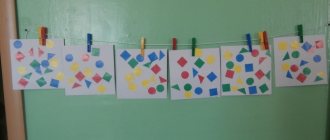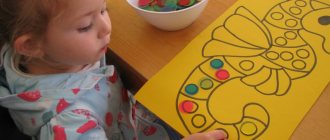Summary of an introductory conversation for children of middle preschool age on the topic “Do good”
Summary of the introductory conversation. My name is Romanenkova Olga Nikolaevna, I have been working as a kindergarten teacher since 1993, I went to this kindergarten when I was little. I was very interested in participating in your competition “Lessons of Goodness”, for the reason that you decided to involve not only schoolchildren, but also preschool children in the topic of charity. This is very important, many believe that preschoolers will not understand conversations about charity. To many, this topic seems complicated, inaccessible to a child, and, moreover, even unnecessary! Like, it’s too early for my baby to know about unpleasant things; when he’s at least old enough to go to school, he’ll see enough of this. Therefore, such mothers and fathers deliberately avoid this issue. If you show your child an example, tell him how useful and important it is, demonstrate how he can participate in this, the support of other people will become absolutely natural and normal for him in adulthood.
I believe that the most important thing is not only to teach children to count and read, but it is also necessary to develop moral qualities. In our garden they pay a lot of attention to patriotic education, for many years our garden worked in an artistic and aesthetic direction, a lot of attention was always paid to working with the family and interacting with the families of pupils. And selfless care for others, sympathy and empathy, mercy and kindness are very important qualities without which a real personality cannot be formed.
Having learned about your competition, I decided to take part in it. Now I have a middle group (children 4-5 years old) And I would like to start introducing my children to charity, already from the middle group. And continue to expand children’s knowledge in the future. The most important thing is not to be afraid that children will not understand or will reject the idea of helping other children or older people. Children are very responsive and merciful: if you explain why people today need support and guide them correctly, they will be sincerely willing to put their efforts into this. At the same time, if you start small, from early preschool age, for example, from the middle group, then by a more or less conscious period they will be ready for more - perhaps already in adolescence, they will show interest in volunteering. And such people should understand perfectly what is good and what is bad, and always come to the aid of anyone who needs it. After all, mutual assistance in many ways makes us all human.
I decided that it was necessary to start introducing middle-aged children to the concept of charity with a conversation. The first conversation is introductory.
Summary of an introductory conversation for children of middle preschool age on the topic “Do good”
Objectives: To introduce children to the concept of charity.
Objectives: To instill in children a desire to help children and people in need. To instill in children love and compassion for others, a desire to help in difficult situations.
Progress of the conversation
Children stand in a circle.
Educator: Guys, today I want to talk to you about the good that we can give to others! Now look at each other, smile. Look how bright it is around you because of your smiles! Take the ball and passing it to each other, remember all the kind words and say them to each other.
Children pass the ball to each other, saying kind words.
Educator : Well done! How many kind words did you remember? Sit down on the carpet.
The teacher distributes white circles to the children. There is a box of pencils on the carpet.
Educator : Now think and paint over the “lanterns” of your mood: if you are in a joyful mood, paint the “flashlight” yellow, and if you are in a sad mood, gray.
Children paint over the "lanterns"
Educator : Have everyone painted over the “lanterns”? What color is your “flashlight”? Why did you paint it yellow (gray)?
Children's answers.
Educator : The world in which we live is wonderful, unique, diverse and beautiful. You and I are a part of this world and it depends on us what it will be like: sunny, warm or cloudy and cold.
Today I want to tell you what qualities a kind person who is able to help other people should have and let’s talk about the noble deeds of people.
The teacher reads a poem:
The house is busy with good deeds, Kindness quietly walks around the apartment, It’s a good morning for us, Good afternoon and good hour, Good evening, good night, It was good yesterday. And where, you ask, is there so much kindness in the house?
Educator : Did you like the poem? How do you understand the word “kind”?
Children's answers.
Educator: Who might need our help?
Children's answers.
Educator: How can you help other people?
Children's answers.
Educator: Guys, what good deeds can you do to help others?
Children's answers.
Educator: Is it possible to force a person to be kind? Ponder.
Children's answers.
Educator: Each of you has a small piece of kindness. A kind person is one who loves people and helps them. The love of a kind person, his help warms like the rays of the sun.
Don't stand by indifferently when someone is in trouble. You need to rush to the rescue at any moment, always. And if your kindness and your smile help someone, you are happy that the day was not lived in vain, that the years you live are not in vain!
There's a knock on the door.
Educator: Oh, guys, do you hear someone coming to visit us?
Doctor Pilyulkin enters.
Doctor Pilyulkin: Hello guys! (children say hello) My name is Doctor Pilyulkin! What is so interesting you are talking about?
Children's answers.
Doctor Pilyulkin: Guys, you are lucky, we have parents who take care of you, we have friends. When you get sick, your mother always comes to your aid, treats you, and consoles you. Do you know that there are children who have no parents and no one to feel sorry for them.
Children's answers.
Dr. Pilyulkin: There are children living next to us who need help. Orphans are nobody's business. They don’t have parents, a mother who can caress you when you’re bad, sad, when you’re sick. They need kindness and help, care.
And we should not remain indifferent. There is such a word as charity. Do any of you know what it means?
Children's answers.
Dr. Pilyulkin: Charity itself is a word, as if it consists of two words - the word good - which is different, we call it good and the word create, and in another way we say do. And you can say that charity means doing good, but to make it clearer to you, I’ll say this, charity means doing good to people! This does not mean that it is necessary to give money, although this can be done, say a kind word, give a smile, provide a person with any help. This also means doing good to people. This is done when you want to say something to each other, support, make each other happy.
Help is not only material - sometimes people need moral support, to be supported, understood, or physical strength.
Today I invite you to also take part in a charity event; next to your kindergarten there is a boarding school for orphans. And you can help them. Guys today, you talked a lot about how you can help such children. What would you like to do for them?
Children's answers.
Dr. Pilyulkin: You can collect a parcel for a children's boarding school: books, toys, educational games, clothes and much more.
Educator: Guys, we can ask your parents to help us collect and take the parcel to a children's boarding school, next to our garden.
Do you agree?
Children's answers.
Doctor Pilyulkin: Guys, do you want to come up with a name for our charity event? (children's answers)
Educator : Doctor Pilyulkin, guys, since we are just learning to do good, let’s call the name of our action “Learn to do good”?
Children's answers.
Dr. Pilyulkin : Great title and it’s clear what you will be doing. Unfortunately, it’s time for me to leave. I wish you to collect a package for the guys. I know they will be very grateful to you. Goodbye, guys! See you again!
Doctor Pilyulkin leaves.
Educator: (reflection) We had a very serious conversation, it probably touched your souls, perhaps you will change your attitude towards your actions. I would like you to understand that we need to provide help to those who need it. But the help should be unnoticeable, selfless. If you really do a good deed for people, you shouldn’t shout about how noble you are. I want to wish you: be more attentive to people, try to understand them, provide all possible help at the right moment, but don’t be proud of it, rejoice yourself, make others happy.
I wish you well, Good night until the morning. I wish everyone good dreams, good deeds and kind words. Will the road lead you away from your beloved threshold, Let someone tell you: “Good hour and good journey!” I wish that people would have more fun with you, that you would look at people with kind eyes.
Educator : Guys, today tell your parents what you learned about and invite them to help the children from the orphanage. We will collect a package for the guys and ask one of the dads to carry it. We will not only do a good deed with you, we will be able to say that for the first time we took part in a charity event, helping orphans.
END!
In the future, I want to try to develop a small system of lessons that will contain more complex material, in accordance with the age and knowledge of the children.


